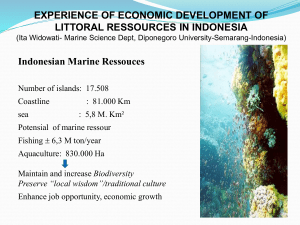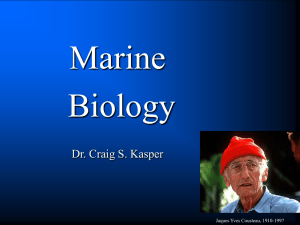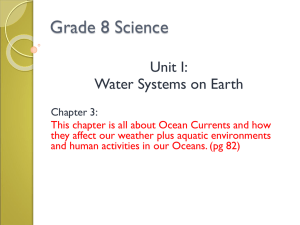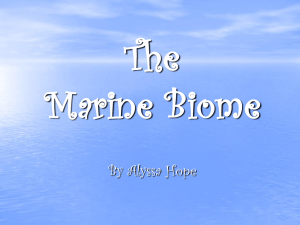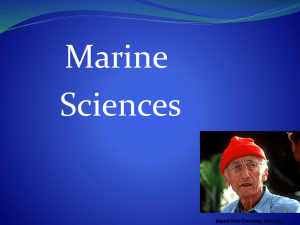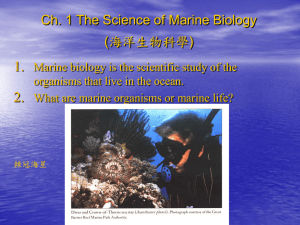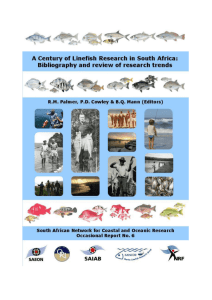The state of marine science in South Africa
advertisement
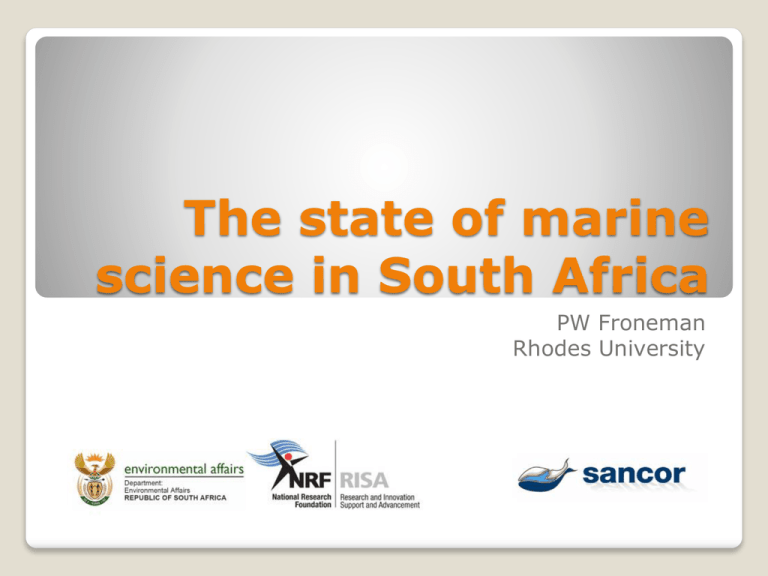
The state of marine science in South Africa PW Froneman Rhodes University Background •Number reports exist on the state of marine research in South Africa. •SANCOR estuaries programme •South African Southern Ocean Research programme •SANCOR occasional reports •Many outdated/regionally/discipline biased and thus provide little support/indication of the current state of marine research in South Africa. •Questions thus arise of where should SANCOR be focussing its future research and how it can address any perceived weaknesses within the marine science community. •Current study was commissioned by NRF (covered the period 1994-2008). •Study was conducted by Scherman Colloty and Associates cc. Tertiary groups & affiliated institutes Government & Parastatal Albany Museum Cape Nature Cape Peninsula University of Technology (Oceanography) Council for Geosciences - Marine Geosciences Database Nelson Mandel Metropolitan University Council for Scientific and Industrial Research (CSIR) Oceanographic Research Institute / South African Association for Marine Department of Science & technology (NRF/RISA) Biological Research Department of Water Affairs (RDM & RQS) Rhodes University Eastern Cape Parks Board South African Institute for Aquatic Biodiversity Ezemvelo – KZN Wildlife University of Cape Town MCM / Oceans & Coasts / DAFF University of Fort Hare Natal Museum University of Johannesburg / ECON&UJ Portnet (Transnet) University of KwaZulu-Natal River Health Programme - Provincial Technical Teams (Estuaries) University of Pretoria - Mammal Research Institute & CWMS South African Biodiversity Information Facility (SABIF) University of Stellenbosch (incl CREST) SANBI Marine Programme University of Zululand South African National Parks Board Walter Sisulu University Water Research Commissions 14 tertiary/research institutes 15 Governmental/parastatal institutions Programmes & Networks African Coelacanth Programme AfrOBIS (Ocean Biogeographic Information System) Agulhus / Somali Current Large Marine Ecosystem Programme Benguela Current Large Marine Ecosystem Programme Cape Action Plan for People & the Environment Consortium for Estuarine Research and Management (CERM) Eastern Cape Research Association for Marine Researchers (ECRAM) KwaZulu-Natal Marine and Coastal Management Research Group (KZN-MRG) Marine and Coastal Educators Network (MCEN) Marine Linefish Research Group (MLRG) River Health Programme - Provincial Technical Teams (Estuaries) South African Environmental Observation Network SANCOR SEAchange South African Marine Linefish Management Association (SAMLMA) Companies & NGO's Birdlife International EnviroFish Africa Ocean Planet Ocean Research Africa / Biotech Ocean Research Conservation Africa (ORCA) World Wildlife Fund Data •Total of 45914 citations /documents were reviewed during the study of which 9568 were marine and coastal related. •During the study, the following data bases were populated: •Total/type of publication •Discipline •Geographic variability •Gender contribution •Cohort contribution •Transformation Outputs •34% of publications appeared in peer reviewed journals •72% of the peer reviewed publications appeared in ISI accredited journals. •Strong preference for local journals (e.g. South African Journal of Marine Science (African Journal of Marine Science), South African Journal of Science, African Journal of Aquatic Science, African Journal of Zoology). •Book/book chapters contributed < 1% of the total number of publications per annum. •Significant increase in production of “grey literature” •Changes in environmental legislation • Management reports •Need to disseminate information in popular press. Disciplines 4.4 11 Biological Physical 12.4 Management 53.6 Engineering 18.6 Social Sciences Conclusions Findings of the current study are broadly in agreement with similar studies conducted in South Africa (e.g. Dieb & Gevers, 2009). Significant increase in total number of peer reviewed articles over period of study. Natural sciences still strongest discipline within marine research (54% of all publications). Strong regional differences in output/postgraduate students (dominance by Western Cape and KwaZuluNatal). Little evidence in support of emergence of new generation of young researchers. Some progress with respect to transformation ◦ Increase in contribution of woman and HDI in outputs Thank you

